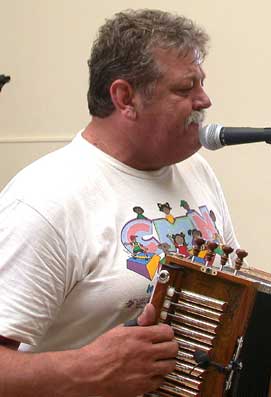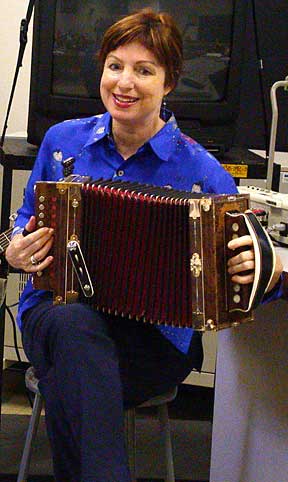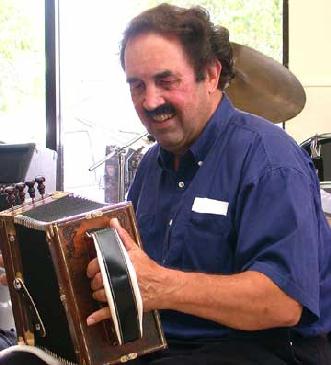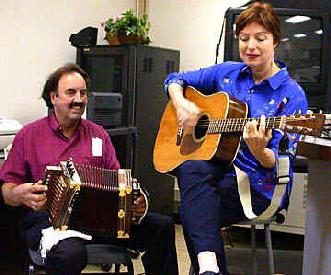|
Archive Files of Cajun, Creole, and Zydeco Musicians |
Marc & Ann Savoy
|
Click here for high resolution photos of the Savoy Family Band on Flickr. Click here to go to Ann Savoy's Official Web Site. And here for the Savoy Music Center. |
|
| During the first half of 2002, Evangeline Made: A
Tribute to Cajun Music, produced by Ann Savoy, was released by Vanguard Records,
and The Divine Secrets of the Ya-Ya Sisterhood, a major motion picture with an
appearance by Ann Savoy and her son, Joel, was released by Columbia Pictures. Evangeline Made was nominated for a Grammy Award in the Traditional Folk Category. On February 7, 2003, Evangeline Made received offBeat Magazine's 2002 Best Cajun Album Award. After the Savoy Family Band performed in Hollywood in early June as part of the premier festivities for the movie, Marc and Ann Savoy were back in Eunice, as shown in the photos on this page. They played at a benefit held at the Northwest Community Center to help pay for the funeral expenses of the brother of a friend, and they made a presentation to teachers in a seminar at LSUE. And, as always, they were at the Savoy Music Store on Saturday mornings for the weekly jam session. During the latter part of June, Ann Savoy performed out west with the Magnolia Sisters and sang with Linda Ronstadt at a festival in Telluride, Colo. During interviews, Ann Savoy has stressed that, as the subtitle of the CD Evangeline Made states, Linda Ronstadt, John Fogerty (who performs "Diggy Liggy Lo," a song written by Terry Clement and first recorded by the Clement Brothers in 1952), Linda Thompson, Patty Griffin, Richard Thompson, David Johansen, Maria McKee, Rodney Crowell, and Nick Lowe performed Cajun songs as "a tribute to Cajun Music." The liner notes include their own brief accounts of how they came to know and love Cajun music. They are not attempting in any way to rival the achievements of the Cajun musicians who created the music: they are only showing their appreciation and trying to expand the audience for Cajun music to include some of their own fans. The all-star Cajun band that Ann Savoy assembled for the CD features musicians like Marc Savoy, Michael Doucet, Steve Riley, Sam Broussard, Christine Balfa, Dirk Powell, Kevin Wimmer, David Greely, Mitchell Reed, Austin Broussard, Jimmy Breaux, David Egan, Jane Vidrine, and others, including her son, Wilson Savoy, who plays piano on the instrumental "Vagabond Special." All-star members of the band also perform the instrumental "Two-Step de Prairie Soileau," and they are the studio musicians for all of the vocalists. If you go to the movie Divine Secrets of the Ya-Ya Sisterhood hoping to see Cajun music featured, you may be disappointed: an old recording of Blind Uncle Gaspard singing "Assi dans la Fenêtre de Ma Chambre" plays for about 30 seconds as the movie begins, and Ann and Joel appear twice briefly during an outdoor party scene set during the World War II years (Joel, who plays fiddle, is wearing a military uniform). They perform three songs originally recorded by Cleoma Breaux Falcon–"C'est Si Triste," "Lulu Revenue Dans la Village," and "C'est un Péché de Dire une Mentrie," with only excerpts of the first two songs heard on the movie's actual soundtrack and the last song barely audible in the background. However, all four songs are included in their entirety on the CD, which was produced by T Bone Burnett, whose recent projects include the CD O Brother, Where Art Thou? Interestingly enough, Burnett had heard recordings of Cleoma Breaux Falcon and had decided to use the three songs before he approached Savoy to see if she would have any interest in performing them. He asked the right person. In her liner notes to The Magnolia Sisters' CD Prends Courage, whose title song is by Cleoma, she describes Cleoma Breaux Falcon as "the most legendary Cajun woman musician ever recorded." Before doing the songs for the movie, she had already recorded "C'est un Péché de Dire une Mentrie" on the Savoy-Smith Cajun Band CD in 1996 and "C'est Si Triste" on the Magnolia Sisters' Chers Amis CD in 2000. Since the party scene is set during the World War II era, when strings predominated in Cajun music, Burnett chose not to use an accordion on any of the songs (the original recording of "C'est Si Triste" includes an accordion). The music suits the party scene perfectly, but, beyond that, the combination of Ann Savoy's vocals and Joel Savoy's fiddle is very appealing. Just as you need to hear all of Ann Savoy's songs instead of the truncated versions in the movie, you absolutely must listen to all 2 minutes and 57 seconds of "Assi dans La Fenêtre de ma Chambre," sung by Blind Uncle Gaspard, accompanied only by a single guitar. There is a sadness in Blind Uncle Gaspard's soft, tender voice that, beyond describing the sense of loss and abandonment when a relationship ends, draws on what must be a kind of collective memory, shared by many Acadians, of the abrupt, forced separation from their homeland when their ancestors were sent into exile in Le Grand Dérangement of 1755. Remarkably, Alison Kraus's English version of the song, using Ann Savoy's translation and an arrangement by T Bone Burnett and David Mansfield, captures the same heartfelt sense of irrecoverable loss. Dan Willging wrote an extensive profile of Ann Savoy in the April 2002 issue of offBeat Magazine (online link no longer available).
Along with Marc and Ann Savoy, Cory McCauley, Mitchell Reed, and other musicians, Coz Fontenot performed at a benefit with a band he calls the New Metro Playboys. He sang familiar Cajun songs in the old high-pitched style. The benefit was held June 8 at the Northwest Community Center in Eunice to raise money to help pay for the funeral expenses of his brother, Lawrence Moose Fontenot. |
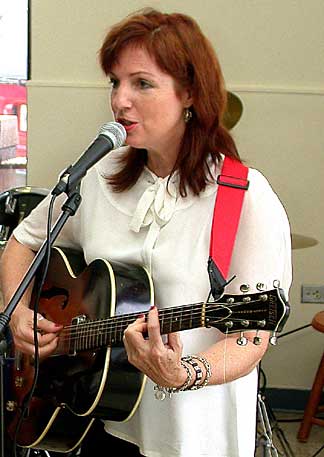
The other photos were taken during a summer teachers' institute at LSUE. The institute, which focused on the Flood of 1927, was led by Dr. Huey Guagliardo and Dr. Anthony Baltakis. The Savoys described the way that Cajuns dealt with such disasters and played traditional songs like "'Tits Yeux Noir" and "Ma Blonde est partie." The institute was funded by a grant from the Louisiana Endowment for the Humanities, the Patrick Taylor Foundation, and the State of Louisiana. |
Posted 7-4-02
All photographs and text by David Simpson.
